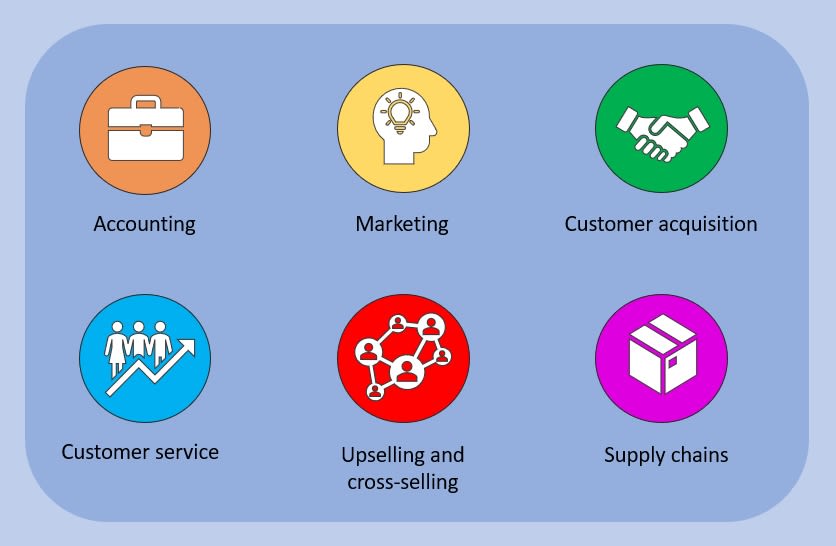
eCommerce Jobs: Top 10 Best Ones
Are you thinking about joining the eCommerce industry and want to know more about the benefits? Or maybe you already have some experience and want to learn more.
Table of contents
This article will tell you why exactly you should go into eCommerce, and what kind of jobs you could get.
Why You Should Get an eCommerce Job
Retail brick and mortar stores are dying, and it’s all because of eCommerce. Once people realized they could shop from home visiting stores in person didn’t seem as appealing anymore.
Just look at Amazon. They’re one of the largest companies in the United States, and the entire world, with a net worth of $1.7 trillion. How did they get there? With eCommerce.
Amazon is just one example of an eCommerce business that’s thriving. Plus, the number of online customers is predicted to double within the next 5 years, even though eCommerce sites already have the greatest number of customers on a global scale.
It’s pretty clear online shopping is the future. So, if you want to get into sales this is likely where you want to be. But what are some other benefits of getting into the eCommerce industry? Keep reading to find out.
1. eCommerce helps you learn many aspects of business
If you work in eCommerce you’re far more likely to be exposed to lots of different aspects of running a business, whereas other jobs would usually only allow you to do one or two tasks.
This includes:
Accounting: Managing finances is key for any eCommerce business.
Customer acquisition: You’ll learn how to identify and find potential customers for a business.
Marketing: By monitoring your customers you’ll begin to see things from their point of view and be able to predict their behavior. This is important for digital marketing.
Supply chains: Discover how to get a product from another country into the hands of your customers.
Upselling and cross-selling: Being able to get customers to opt for a more expensive option, or buy additional products, is a hallmark of a successful salesperson.
Customer service: Even though you’re not dealing with people in person you still need to deliver an excellent shopping experience.
These skills are included in many job descriptions for entry-level and more senior positions. Plus, the more you know about different business dynamics, the better you’ll be prepared for future endeavors.
2. eCommerce can help you start your own business
Have you been thinking about starting your own business? eCommerce is a great jumping-off point.
After working in eCommerce, you’ll have a much better understanding of business and how everything works. So, if one day you decide you’re tired of taking orders, then it’s time to launch your own business!
You’ll be able to use the knowledge and skills you’ve acquired to successfully start your own business, without having to spend money on a course to get the same qualifications.
If you already have some experience or want to try starting your own online store then Amazon is one of the easiest ways to build a business. You can sell products on their platform and take advantage of the massive amounts of traffic on their site.
There are tools available that make it easy to start your own business on Amazon. For example, AMZScout’s Product Database will help you generate profitable product ideas, and then you can validate those ideas with data from tools like the AMZScout PRO Extension.
If you want to get some experience in the industry before striking out on your own then look below for some excellent job opportunities for beginners.
3. eCommerce has the best long-term global growth outlook
The eCommerce market has been able to sustain growth for years, and the pandemic has only sped that up. With many businesses having no other choice but to close doors, and everyone else forced to stay inside, this has created the perfect opportunity for people to join the eCommerce industry.
The COVID-19 pandemic has led to tons of more people shopping online – and for all types of products. This has enabled people to have a much greater exposure to eCommerce.
eCommerce is one of the fastest-growing sectors with more than $1 trillion of the total market and it’s predicted to grow by 17% each year.
It’s likely that online shopping will become the preferred method, even after the pandemic is over, as we’ve seen how much easier and less time-consuming it is.
So what does that mean? Likely an increase in available job positions and growth in the eCommerce industry.
Top 10 Best Jobs
Now that you’re convinced of going into the eCommerce industry, what kind of jobs are there? Whether your skills lie in management, writing, design, IT, or marketing - there’s plenty of options available. Best of all, many of these jobs are remote.
We have prepared a list of the best eCommerce jobs for you:
SEO Expert
Web-developer
Business Analyst
Graphic Designer
Content Writer
Marketing Specialist
Virtual Assistant
User Experience (UX) Designer
Social Media Manager
Digital Project Manager
Let’s take a closer look:
1. SEO Expert
An SEO expert is someone who optimizes websites to achieve higher search engine rankings. Having a qualified SEO expert as part of your online business can help tremendously.
They’ll identify the weak areas in the marketing, and make adjustments that will enable your website to generate more traffic and rank higher up in search engines.
Their tasks include:
Researching the best keywords to use in titles
Developing, implementing, and strengthening link building strategies
Researching and analyzing the backlinks of competitors
Running tests, then collecting and analyzing the data
Identifying trends in SEO
Monitoring, analyzing, and reporting website analytics recommendations
Working together with marketing to ensure quality SEO content is being produced
The typical salary of an SEO expert ranges between $61,900 to $74,700, with an average of $68,400.
2. Web-developer
The first step to having an online business is to create a website. Without a website, your business doesn’t really exist in the digital world.
A good web developer can really make or break a website. Just think of how many times you’ve clicked on a site, and then quickly clicked back to the search results because the site looked super unprofessional, or kept showing errors on certain webpages.
It’s always helpful for a web developer to have at least some background knowledge of computer programming and graphic design to ensure the maximum positive user experience.
A web developer is responsible for:
The coding, layout, and design for a website in accordance with the company’s requirements
Creating contingency plans in case of errors on the website server
Maintaining and upkeeping the website
Updating websites to meet modern standards
Monitor website traffic
Every business needs a web developer, meaning there are lots of cities with demand for this position.
The salary for a web-developer is usually between $50,990 to $95,000, with an average of $69,430.
3. Business Analyst
Business analysts work with companies to help them improve their productivity and increase sales.
Many organizations make use of business analysts, as they have proven to be extremely useful. This means that there is quite a high demand for them, and the pay can be quite rewarding.
It is a business analyst’s job to:
Analyze the business structure and dynamics
Identify weak spots in the business’ system
Research and analyze data to create solutions
Suggest new strategies
Oversee and monitor the newly implemented systems
Run training and workshop sessions to improve business knowledge and skills
A business analyst’s salary can range between $68,770 to $85,560, with an average of $76,590.
4. Graphic Designer
Graphic designers design the graphics used in media products such as advertising, labels, magazines, and signage.
Design is so important when it comes to branding and marketing. Without a good graphic designer, you may lose a lot of customers as they won’t be visually attracted to your product or company.
It’s got to be simple, yet accurately represent the organization and convey a specific message.
Their tasks include:
Creating and developing concepts, graphics, and layouts for product illustrations, company logos, and websites
Interpreting the brand and marketing requirements of clients to increase sales and convey a specific message to customers
Working together with content writers, art directions, organizations, and designers to ensure maximum success
Evaluating the final layout and suggesting improvements
If you don’t want to work for someone else this can be a great freelance job as well.
The salary of a graphic designer is typically between $47,940 to $103,490, with an average of $75,720.
5. Content Writer
Content writers (also sometimes known as copywriters) create content. They write for news sites, websites, podcasts, infographics, and much more. A good writer is something all organizations need.
They’ll be able to turn boring, information-heavy content into something light, fun, and easy to read. This means they have the task of setting the tone and getting their target audience’s attention.
Their job includes:
Creating content that is relevant, accurate, and well-written
Deciding on what content is written
Researching their topics and comparing data with different sources
Setting the tone for the content, and ultimately the website
Being responsible for the customer’s impression of the website/business
A content writer may expect a salary between $58,860 to $69,850, with an average of $70,615.
6. Marketing Specialist
Marketing plays a key role in eCommerce. A marketing specialist will help businesses keep track and understand market trends by analyzing the data on local, regional, and national levels.
Their job is to determine:
Which products people are buying
Which kind of gaps are in the market
What kinds of people buy which products
How much money people are willing to spend on those products
Once they’ve determined these, they need to:
Create marketing strategies for the business’ projects, websites, and social media
Ensure that the promotions and products are all specifically customized to the consumers’ demands
Basically, their goal is to increase sales, which makes it a very important job.
A typical salary is between $60,260 to $80,990, with an average of $70,620.
7. Virtual Assistant
An assistant’s job is relatively straight forward. They make life easier for the boss. In the eCommerce world it’s the same, except it is done virtually.
Many company executives and CEOs need assistance completing tasks, and it’s the virtual assistant’s job to help out as much as possible.
A virtual assistant’s job includes:
Arranging and organizing meetings
Making and checking schedules
Answering emails
Helping to pitch ideas
Organizing files
Because there aren’t a lot of skills or experience required this is a great job for freshers.
A virtual assistant’s salary is usually between $28,000 to $73,000, with an average of $57,023.
8. User Experience (UX) Designer
User experiences are the interaction between customers and a company website or app, making them very important to a business’ success. This is what a UX designer is in charge of.
They also focus on acquiring and integrating a product, which includes the design, function, branding, and usability.
They are responsible for:
Testing the user experience of applications, software, and websites
Evaluating the user experience of existing systems
Suggesting changes for a new and improved system
Customizing the website to its target audience
Understanding customer experience and online marketing
Ensuring the products deliver maximum efficiency and satisfaction
The salary of a User Experience Designer is typically between $99,660 to $130,580, with an average of $112,890.
9. Social Media Manager
Social media isn’t just a place to post your best selfies. It’s actually a fantastic platform to reach more customers. Tons of businesses take advantage of these platforms and incorporate them into their marketing, so much that they actually hire social media directors.
It is these people’s job to:
Represent their company on various platforms such as Facebook, Instagram, Twitter, and many more
Respond to comments from their customers on social platforms
Design and produce creative content to post online
Use the right keywords, links, and hashtags to promote the company
To manage and organize paid adverts on social platforms to generate more organic traffic and to monitor and analyze their customer’s reactions
A social media manager can expect a salary between $57,850 to $77,380, with an average of $66,620.
10. Digital Project Manager
A digital project (DP) manager oversees online projects from conception to completion, ensuring it stays within the business’ budget and available resources. Projects are constantly on the go, so if your DP manager isn’t good at their job it can bring the whole business down and significantly decrease productivity.
Typical digital projects can include:
Websites
Events
Advertising
Mobile Apps
Social media
It’s their job to:
Plan, delegate, track, review, and measure results - using project management software, such as Basecamp
Ensure that all tasks are completed before the deadline
Ensure that the project is within business goals
The salary for a digital project manager is usually between $67,830 to $84,540, with an average of $74,610.
Conclusion
Ecommerce is a booming, ever-growing industry. Both the sales and revenue in the industry have been increasing more and more each year for over a decade. It also has jobs for different skills, as well as valuable experience. Because of this, there couldn’t possibly be a better time to start a career in eCommerce. So, what are you waiting for? Whether you’re in the USA, UK, or anywhere else this is a great opportunity. Think about which area you would be best suited in and start fixing up your CV.








